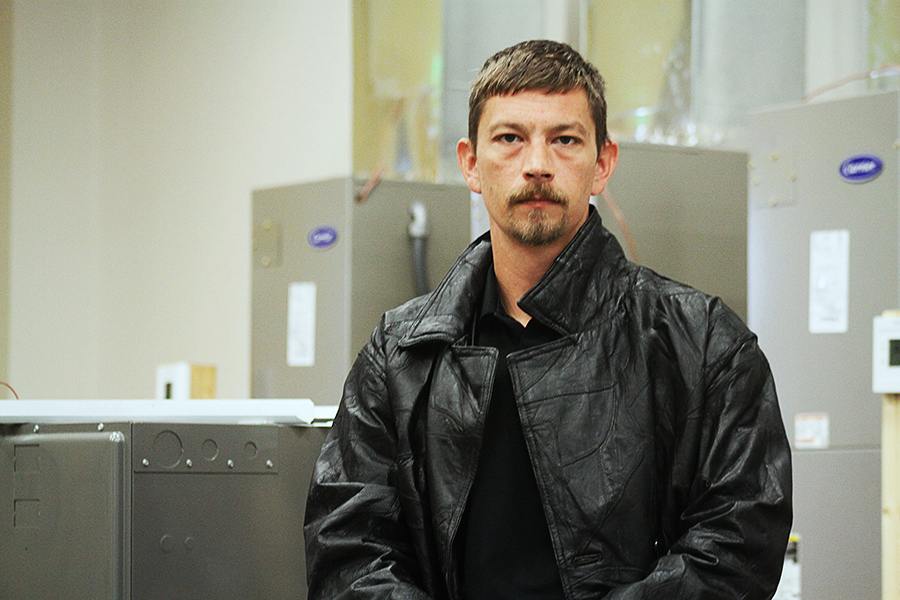Warner Robins, Ga. – The military or the country doesn’t owe Jeremy Steen anything; no express line at the Veterans Affairs office, no low-interest rate on a home, no bill for education, no free meal with proper identification.
In fact, before anyone knew about how his life spiraled downward after exiting the military in 2005, how he would lose his fiancé to cancer this year, his driver’s license to alcohol, his kids to instability and his home to his crumbling circumstance, he had a lot of time to think. He thought about his situation, next steps, sure, but never considered how any service for veterans could help.
That was until the Georgia Veterans Education Career Transition Resource (VECTR) Center prepared a way.
“A lot of this is all new to me,” Steen said. “There are a lot more veterans out there who are down on their luck or just in a worse place, but what the VECTR Center is doing is showing there is hope for any situation.”
Steen said before his introduction to the work of the VECTR Center and even after he knew they could help, he was reluctant to share his civilian struggles with anyone. Following time in the Marines and Army, his life, while traumatic, had existed without the scars of war, and carried wounds that have largely been self-inflicted.
“The best way to put it is that for the last few years, I have existed, but I haven’t lived,” he said.
The transition has been thirteen years in the making for Steen, struggling to live day to day as a civilian with a military mentality. For the last three months, he has resided at a local Salvation Army center, homeless due to a whirlwind of circumstances – financial, physical and emotional – he was self-admittedly, “unable to handle.” He said that ingrained in him from service early on was a sense of pride about all he does; a sense he failed to put aside when it was most required of him.
As a former diesel mechanic in both branches, Steen did not see combat action during his service. Yet, service life is still so different from civilian life and when approached by his own devices, it offered him very little for ease of transition.
“The mentality they teach you in the military does not transition over well. The standard they hold you to is just a lot higher than what you are expected in civilian life,” he said. “We are so by-the-book, but the VECTR Center and this program have taught me a different approach.”
Thanks to a new Heating, Ventilation and Air Conditioning (HVAC) program from Central Georgia Technical College (CGTC) at the VECTR Center, Steen is transitioning experience as a mechanic into one of the nation’s most in-demand careers.
Serving veterans of all branches, bruises, and backgrounds, the Georgia VECTR Center is the result of statewide wherewithal between the University System of Georgia (USG) and the Technical College System of Georgia (TCSG), recognizing the need to assist service members as they transition to civilian life. The Center opened its doors in 2016 as a one-stop-shop design, housing under one roof, educational institutions and partners from Georgia Department of Veteran Services (GDVS), Georgia Department of Labor, the local Workforce Board, the Department of Veterans Affairs, and the United Way and its Mission United.
Unique to the nation and military community at large, the VECTR Center continues to serve as the standard for education, training and transition services to veterans.
Every so often, the needs of veterans expand. In order to meet those needs, leadership at the VECTR Center must do one thing above all others.
“We do a lot of listening,” said Ret. Col. Patricia Ross, the chief executive officer of the VECTR Center. “We do have interest and skills assessments that can help narrow down the options for those that are unsure of what to do next, or are simply overwhelmed at all the options, but our veteran success coaches really listen and help create a personalized plan for each veteran or their spouse.
Ross said veteran success coaches also follow up and make sure to offer support, engaging any resources that can assist a specific situation.
“It truly took the entire team and the community to help with Jeremy and many others. But, that’s what we do,” she said. “Having all served ourselves, or having been a military spouse, we understand some of the challenges and are passionate about helping others.”
If the VECTR Center has done anything for Steen, it’s been put him in projects and courses around peers who understand the precision of military training but also the need for civilian soft skills. He credits his instructors and staff at the Center in particular for this understanding.
He said he wants fellow veterans to know the work of the VECTR Center is not one of those ‘flash in the pan’ helps. It is going to be helpful for him, “many years after this,” he said.
“I don’t want to say the military owes me for anything, maybe a little more preparation for the transition, but now it’s twelve, thirteen years later, and I am just glad I have an opportunity to make everything right.”
“Thanks to this place, I have an opportunity to fix all the things I had messed up.”
For more information about the Georgia VECTR Center, contact Col. Patricia Ross at pross@gavectr.org or visit, www.gavectr.org

Photo: Jeremy Steen is a veteran who served time in the Marines and the Army. He resides at a local Salvation Army shelter and through the Central Georgia Technical College HVAC program at the Georgia VECTR Center, he is finally learning to transition into civilian life and move past his struggles.
